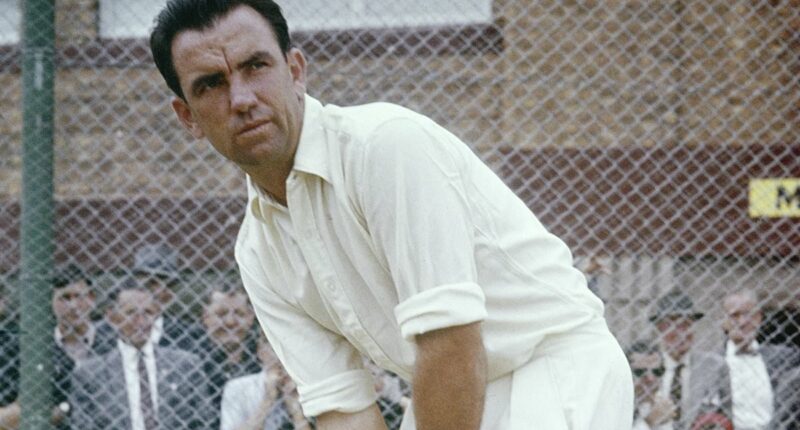Share this @internewscast.com
Bob Simpson will be remembered as one of the most influential men in Australian Test cricket history after dying age 89 on Saturday.
Simpson, nicknamed Mr Grumpy by friends and family, died in Sydney with tributes to the champion player and coach flowing in.
He is credit with saving Australia from collapse twice in his career, once as a player and once as a coach, leaving an enduring legacy.
‘Bob Simpson’s extraordinary service to Australian cricket spanned generations,’ he posted on X.
‘As an exceptional player, captain, and later a transformative coach, he set unparalleled standards for himself and those he led to championships. His legacy will long be cherished by the sport he adored. May he rest in peace.’

Bob Simpson will go down in history as one of the most influential men in the history of Australian cricket

A champion player, the stylish batsman was also a highly successful coach during his long career in the sport
Simpson was an outstanding Australian batsman and part-time leg-spin bowler who made his debut for Australia in 1957. Over the course of his career, he played 62 Tests and amassed 4,869 runs with an impressive average of 46.81.
He was particularly noted for his focus and stamina at the wicket, best exemplified by his epic 311 against England at Old Trafford in 1964, which stands as one of the longest innings in Test cricket history.
Serving as captain from 1963 to 1968, he guided Australia through a period of rebuilding, reclaimed the Ashes in 1964, and instilled a sense of discipline and toughness in the team.
After stepping down, Simpson returned as Australia’s coach in 1986 during challenging times, mentoring a new generation of players such as Allan Border, Steve Waugh, and David Boon.
His leadership culminated in Australia’s landmark win in the 1987 World Cup, securing his legacy as both a remarkable player and one of the most influential personalities in Australian cricket history.
Bob Simpson was a disciplinarian who demanded total commitment from his teammates and wanted them to ‘live’ cricket as he did.
His strict approach didn’t always please the players, but it brought results and restored order to the side.
Australia’s style under Simpson was often labelled dour, with long defensive batting spells from himself and Bill Lawry used to cover the lack of a strike bowler.

Simpson emerged as Australia’s saviour in the 1980s, when he stood up as coach with the team in crisis
This approach contrasted sharply with the attacking flair of Richie Benaud’s era and contributed to falling crowd numbers.
As captain, Simpson set himself apart by fielding at first slip, where his sharp reflexes earned him 110 catches, including 30 against England.
After retiring, he returned in 1977 to steady the team during the World Series Cricket crisis and later became national coach in 1986 when Australian cricket was struggling.
His hard-nosed methods transformed a young side, leading to a World Cup win, Ashes success, and even a rare series victory over the West Indies.
In 2007, he said the key to his success was not coaching the individuality out of his players.
‘My theory is that you coach the naturalness of a player, and once you develop that you get all these lovely individual styles which are so attractive to the public and so effective,’ he said.
‘If everyone bats the same … it’s very easy to bowl to them.’
In the late 1990s, Simpson was appointed to the Marylebone Cricket Club’s (MCC) Laws sub-committee, the body responsible for preserving and updating cricket’s rulebook.
He contributed to the 2000 Code of Laws, the first full revision since 1980, which clarified long-debated areas such as handling the ball, obstructing the field, and restrictions on ball tampering, while also modernising language to reflect the changing game.
Simpson was also recognised for his services to cricket when he was appointed a Member of the Order of Australia (AM) in 1978. Nearly three decades later, in 2007, his honour was elevated to Officer of the Order of Australia (AO)











